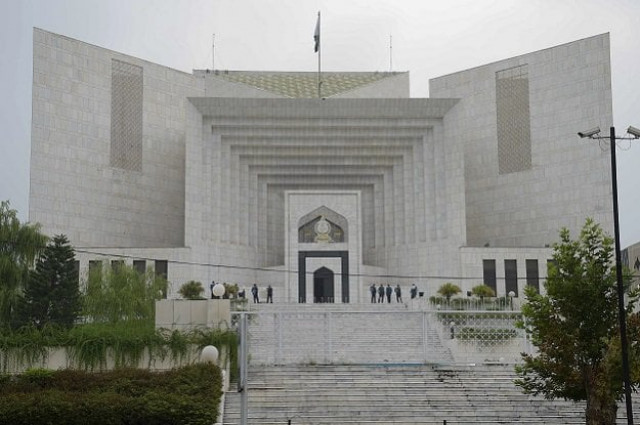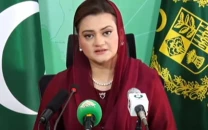SC rejects LHC judge plea against his relegation
Upholds high court chief justice’s admin order re-fixing seniority of judges

Supreme Court. PHOTO: AFP
A five-judge larger bench headed by Justice Sheikh Azmat Saeed rejected a two-year-old constitutional petition filed by LHC Justice Khan against his relegation.
The reasons of the judgment will be issued later. In view of the order, Justice Khan, who is fifth on the current LHC seniority list, will be relegated to seventh place. Consequently, he will also be deprived of becoming the chief justice of LHC.
In view of the order, the appointment of a judge begins when he takes oath and not the date of issuance of notification for his appointment.
Additional Advocate General Shan Gul while arguing on behalf of the LHC said a judge’s appointment process culminates after he takes oath. If a judge does not take oath he cannot perform his duties as a judge. Punjab Advocate General Ahmad Awais endorsed his view.
On December 9, 2016, a two-judge SC bench comprising then chief justice Anwar Zaheer Jamali and Justice (retired) Amir Hani Muslim, while admitting Justice Farrukh Khan’s petition for regular hearing, had suspended the operation of the LHC chief justice’s administrative order.
The federation through the Ministry of Law and Justice, the LHC through its registrar and LHC Justice Muhammad Qasim Khan, Justice Syed Mazhar Ali Akbar Naqvi and Justice Mazhar Iqbal Sidhu were made respondents by Justice Khan in his petition filed through Hamid Khan and Rashid A Rizvi.
The petition said Justice Khan, along with 21 other additional judges of the LHC, had been appointed through a notification issued by the law and justice ministry on Feb 17, 2010.
The petitioner, who was in the United States at the time, was informed through his brother by the then LHC chief justice Khawaja Sharif about the notification and the oath taking ceremony on Feb 19.
Since it was not possible for the petitioner to reach Lahore at such a short notice, the then chief justice had agreed to administer oath to him on Feb 20, 2010. Justice Sharif administered the oath to 21 additional judges on Feb 19 and to Justice Farrukh Khan on Feb 20.
The petitioner cited the example of delaying the oath taking of retired Justice Rustam Ali Malik till his return from abroad.
In order to ensure that no prejudice was formed, the then LHC chief justice through senior puisne judge Justice Ijaz Ahmad Chaudhry had sought consent from other 21 judges that they would not object to the fixing of seniority according to the notification. All the judges had assured the chief justice that they would not object to determine seniority in accordance with age.
Accordingly, a seniority list was prepared in which Justice Khan was senior to Justice Qasim Khan, Justice Mazhar Naqvi and Justice Mazhar Sidhu.
But the three judges later filed a representation before then chief justice Khawaja Imtiaz Ahmad, seeking to fix seniority in accordance with the date of oath taking.
Justice Khawaja Imtiaz advised the three judges to seek legal remedy.
They neither sought the legal remedy during the tenure of Justice Khawaja Imtiaz nor filed any representation before Justice Manzoor Ahmad Malik and Justice Ijazul Hasan who served as chief justices of the LHC.
“This clearly shows that they had acquiesced in the decision of then chief justice Khawaja Imtiaz Ahmad,” the petition argued.
The petitioner pointed out that he was presented as senior to the three respondent judges not only during the tenure of Justice Khawaja Sharif but also six other chief justices of the high court — Justices Ijaz Ahmad Chaudhry, Sheikh Azmat Saeed, Umar Ata Bandial, Khawaja Imtiaz Ahmad, Manzoor Ahmad Malik and Ijazul Hasan.
He said the respondents had filed a representation before incumbent LHC Chief Justice Syed Mansoor Ali Shah, adding that he had been given a copy of the representation but was never asked to file a formal reply.
Justice Khan said that on Nov 22, 2016 that the chief justice had summoned him to his chamber where the three respondent judges were present and asked all of them to settle the issue amicably.
The petitioner said he was surprised to know that Chief Justice Mansoor Shah had recorded a formal finding in a formal order purportedly passed on Nov 26, consequent to which his seniority was re-fixed and placed below that of the three judges.
The petition argued that it had been a consistent view of the apex court as well as the Supreme Court of India that the seniority of a judge had to be reckoned from the date of his appointment and, in case the date of appointment of two or more judges is the same, then it would be in accordance with the ages of the judges.
“The date of taking oath after appointment of judges has never been taken as a factor for determining seniority,” it said.
Justice Khan had requested the SC to set aside the LHC chief justice’s Nov 26 order and restore his seniority to the place it stood in the seniority list prior to the impugned order. However, the bench rejected his plea. The same judge is also facing proceedings for misconduct before the Supreme Judicial Council (SJC).



















COMMENTS
Comments are moderated and generally will be posted if they are on-topic and not abusive.
For more information, please see our Comments FAQ